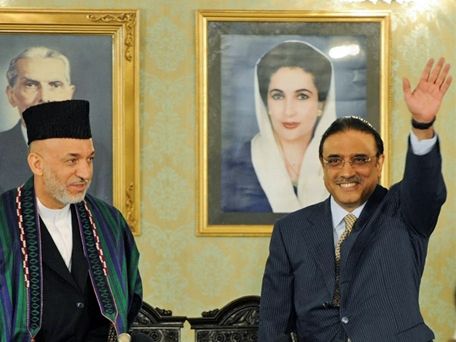
Quite a number of serious and informed observers predict a spike in mass casualty violence hitting this week in Pakistan. President Obama is about to have both collective and separate meetings with Afghanistan President Hamid Karzai and Pakistan President Asif Ali Zardari — and many believe that Taliban insurgents will be attempting to send the message that both leaders are weak and that the place to discuss the future of the region is not in Washington, but in the region with Taliban leaders.
Others think that some of the violence will be orchestrated by forces loyal to President Zardari and/or related to the military in order to extract military assistance and aid concessions from Obama and his team.
 The mounting tensions in Pakistan were brought home to me personally when I learned that the United States Central Command has rejected on security grounds the visit of Patrick Cronin to Pakistan today. Cronin is Director of the Institute for National Strategic Studies at the National Defense University and Senior Adviser and former Director of Studies at the Center for Strategic and International Studies and also served as Director of Studies at the International Institute for Strategic Studies.
The mounting tensions in Pakistan were brought home to me personally when I learned that the United States Central Command has rejected on security grounds the visit of Patrick Cronin to Pakistan today. Cronin is Director of the Institute for National Strategic Studies at the National Defense University and Senior Adviser and former Director of Studies at the Center for Strategic and International Studies and also served as Director of Studies at the International Institute for Strategic Studies.
To be clear, although Cronin had received clearance for the Pakistan visit from those in command in Pakistan, his visit was yesterday rejected because “facts on the ground had changed” and CENTCOM refused to override. The fact is that it easier today to visit Baghdad than Pakistan.
Cronin’s visit to Pakistan was important not only for his own assessment of what is taking place in Pakistan — but his relations with key parts of the Pakistan military and intelligence establishment and his ability to speak with the lesser known parts of these security bureaucracies as a policy intellectual and to some degree an American national security bureaucrat. Cronin is respected by both Democrats and Republicans in the U.S. and is known to be a useful source of counsel to the operations run by Robert Gates, Dennis Blair, Mike Mullen, Richard Holbrooke, and David Petraeus.
From my vantage point these last couple of days in Qatar, one can readily sense the gap in tension and concern between serious policy players in the Middle East who are concerned about trends in Afghanistan and Pakistan and those in Washington, who despite the increased reportage on the region, seem to be buffered from the make-or-break realities immediately upon the US and its allies.
Cronin was traveling to Pakistan with support and backing of U.S. Central Command — and when I arrived with Patrick Cronin on Sunday night in Doha, he said to me that the U.S. military authorities who were organizing part of his trip refused to allow him to stay in a hotel and were insisting he stay on the military compound. In other words, the intelligence in hand at Central Command fears an uptick in suicide bombings over the next week directly targeting hotels and high population centers where foreigners populate.
Another former senior US government official at the conference I am attending in Doha told me that Obama and Petraeus may be pushing over the next week or two a hard core push by the Pakistan military in the Swat region. Zardari and the military are resisting — and believe that the deal signed and ratified with the Taliban now running Swat can’t be undone — but word is that the US is insisting that this deal with the Taliban not stand. The price for action if Zardari concedes will be massively increased aid and lots of “helicopter gun ships” which the Pakistan military thrives on.
Another issue that is vigorously percolating right now is the controversial use of drone attacks to attack the minor and mid-level operations leadership of al Qaeda and Taliban insurgent groups. Some like National Defense University military expert Patrick Cronin believe that the tactical US military success of knocking out Taliban and related insurgents and disrupting operations that they have planned is blinding General Petraeus and other senior Obama administration officials from the fact that these drone attacks are fueling the growth and popularity of the insurgency — and that the tactical is undermining the strategic.
In other words, some believe that we are potentially on the verge of seeing the Pakistan government collapse and run a serious risk of Taliban/al Qaeda takeover of the Pakistani government because of the corrosive results of drone attacks.
Cronin reported to me that these drone attacks should only be used in the most extreme cases — preferably when either al Zawahiri or bin Laden are in their sites — or those at the very highest echelon of American targets. The rank and file should not be, in his view, the primary casus belli for unrelenting drone attacks — which have killed too many other innocent victims. The Taliban, in response, have been able to successfully combine the public outrage over the drone attacks with an anti-American nationalism that is appealing to a broader array of Pakistani citizens.
Regional envoy Richard Holbrooke is working to get the pieces of a sensible Afghanistan-Pakistan strategy together — but he must get the U.S. military operations that are undermining key strategic interests under control. Holbrooke does not yet have an arrangement with Petraeus that subordinates the military operation entirely to the course that Holbrooke is crafting with Obama’s confidence and support.
One other scary issue that is lurking the more that Obama and others publicly state that they have high confidence in the locked down state and security of Pakistan’s nuclear weapons arsenal is what Pakistan’s working doctrine is when Pakistan goes on “high alert.”
Such “high alert” status can be triggered in an escalation with India or if the Pakistan military fears that the Taliban have made too many inroads and must be shut down — and declares martial law.
In such a case, Pakistan’s nuclear doctrine states that their nukes go mobile — and are moved “on trucks,” according to one knowledgeable source.
This person said to me, “what roads do you think would be safe in Pakistan?”
So, while President Obama is correct to say that the nuclear stockpile is secure for now, any one wanting to give Taliban insurgents a helping move could trigger another Mumbai-like terrorist attack, or create other sorts of high casualty incidents to goad the military alert level to move up.
And then what was secure no longer will be — as a matter of deeply embedded security doctrine.
One other interesting tidbit here in Qatar is that many Arabs who have moved in and around Pakistan believe that President Zardari is no longer “Mr 10%.”
They call him “Mr. 20%.”
— Steve Clemons


19 comments on “Surge in Pakistan Violence: U.S. Central Command Warns Patrick Cronin to Stay Home”